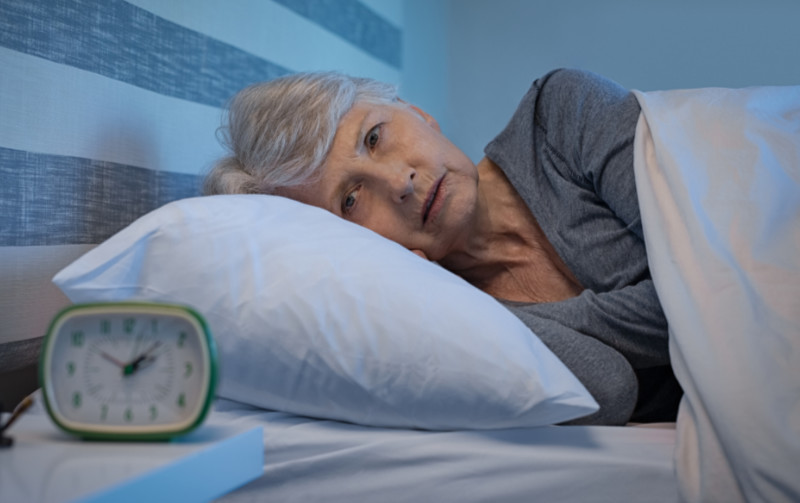A warm bath, a cup of milk, no screens in the bedroom, the comfiest sheets you can get your hands on, and sleep trackers and stat counters galore – it doesn’t seem unreasonable to do everything possible to achieve a good night’s sleep, especially if you find it tricky to drift off.
However, all that well-intentioned, tech-reliant slumber prep can tip into unhealthy sleep-related habits if you’re not careful, and lead to ‘orthosomnia’ – losing sleep over, well, losing sleep.
“Orthosomnia stems from the Latin terms ‘ortho’ meaning correct and ‘somnia’ meaning sleep,” explains Rob Hobson, a nutritionist and sleep ambassador, author of The Art of Sleeping (HQ, available November 14). “This term was coined by researchers to describe the potential risks associated with people who develop an unhealthy preoccupation with improving the data from their sleep tracker.”
How does it develop?
“Sleep trackers can offer useful insight into your pattern of sleep, but the data is not always that precise,” notes Hobson. “For example, many of them are not hugely accurate at distinguishing between the time spent asleep versus the time spent in bed.
“Orthosomnia develops when too much focus is put on this sleep data in an attempt to achieve the perfect sleep score. Over time, this can lead to unhealthy sleep behaviours.”
What are the symptoms?
Some of the symptoms associated with orthosomnia include; difficulty nodding off and staying asleep, waking up too early, unrefreshed sleep, anxiety, depression, fatigue, irritability and poor concentration.
“The obsessive focus on improving sleep in this way may actually cause your sleep to suffer,” continues Hobson. “Orthosomnia may be recognised in someone who has been using a tracker but finds their sleep has worsened as they attempt to make changes to optimise the data (sleep score) to get the ‘perfect’ sleep.”
Why is it a problem?
Sammy Margo, The Good Sleep Expert (thegoodsleepexpert.com), says that becoming “too dependent upon trackers which may be inaccurate or incorrect,” means you can “forget to listen to your body and what it needs.”
“The more you think about sleeping the less easy it can be to actually fall asleep. In the quest for sleep perfection, people can develop increased anxiety and stress which activates the sympathetic nervous system and can prolong wakefulness,” explains Hobson.
“Research has shown how people become reliant on their tracker to tell them whether they got a restful sleep rather than how they actually felt. It has also been shown how people self-diagnose and convince themselves they have a sleep disorder based on the sleep data, even though they may not,” he adds.
“Research has also shown how people may spend excessive amounts of time in bed in an attempt to get higher numbers on their sleep score. This behaviour only reinforces poor sleeping habits and can condition the body for sleeplessness, and may lead to future issues with insomnia further down the line.”
How can you manage it?
Hobson suggests getting rid of your sleep tracker, “but you could also try and use the tracker in a more useful way to help you adopt better sleep hygiene habits.”
Margo advises “gradual disengagement” and using trackers “part time”, while both advocate for establishing good sleep hygiene habits – for example, Hobson suggests, by “keeping a constant bedtime and wake time that also allows you to try and get the number of hours sleep to meet your needs.”
He adds: “Try relaxation techniques before bedtime to help ease and calm a busy mind. Create a calming sleep environment that is dark, cool and clutter-free.
“Wake time is especially important. Try to expose yourself to as much light in the morning to optimise your circadian rhythm.”
However, in more challenging cases, you “may need to participate in some sort of treatment, such as cognitive behaviour therapy for insomnia,” he says.
What can actually help with getting a good night’s sleep?
“Enforce a digital detox a couple of hours before you go to bed,” encourages Hobson. “Phones, laptops and TVs not only emit blue light, which can hamper the release of melatonin (the sleep hormone), but can also create anxiety and stress in the moments before bed when you should be relaxing.”
“Bodies like rhythm and routine,” notes Margo, adding that we need to “set aside time for a bedtime routine in our busy 24/7 lifestyles, “in order to properly unwind.”
































































